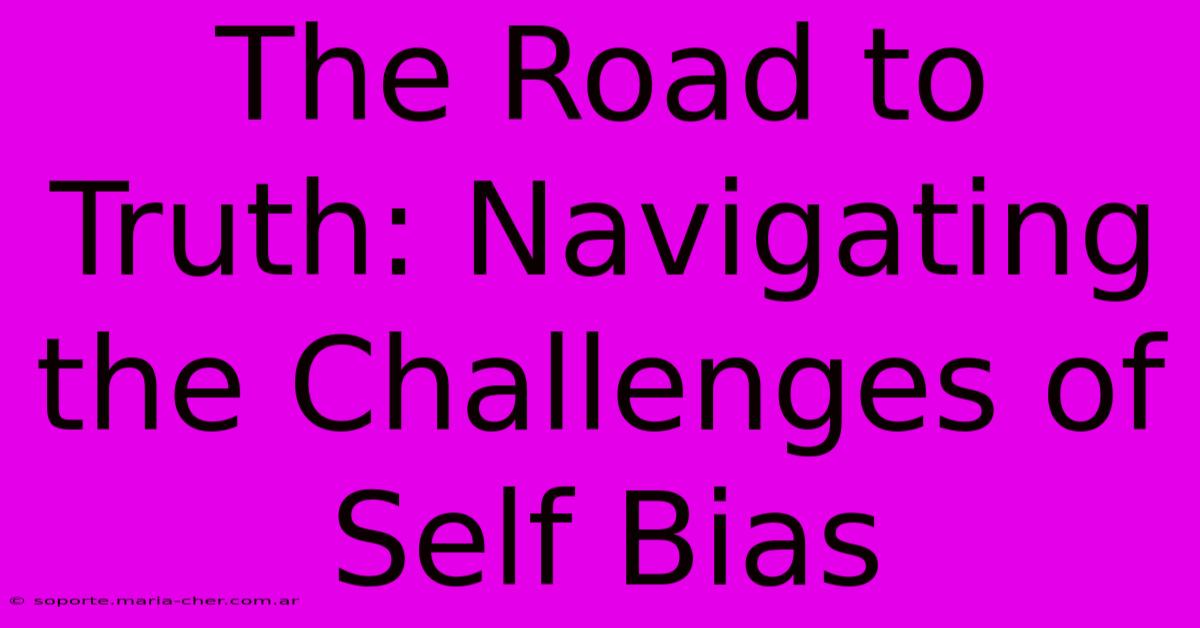The Road To Truth: Navigating The Challenges Of Self Bias

Table of Contents
The Road to Truth: Navigating the Challenges of Self-Bias
The pursuit of truth is a lifelong journey, a quest often hampered by our own inherent biases. Understanding and overcoming self-bias is crucial for personal growth, strong relationships, and objective decision-making. This journey requires self-awareness, critical thinking, and a willingness to confront uncomfortable truths about ourselves.
Understanding the Nature of Self-Bias
Self-bias, also known as egocentric bias, is the tendency to perceive oneself in a more favorable light than is objectively warranted. This isn't necessarily about conscious deception; it's a subtle, often unconscious distortion of reality rooted in our psychological makeup. Several key types of self-bias complicate our pursuit of truth:
Confirmation Bias: The Comfort of the Familiar
Confirmation bias is the cherry-picking of information that supports pre-existing beliefs while ignoring or dismissing contradictory evidence. We gravitate towards information confirming our worldview, creating an echo chamber that reinforces our biases rather than challenging them. This hinders our ability to see the bigger picture and accept alternative perspectives.
Self-Serving Bias: Taking Credit, Avoiding Blame
This bias involves attributing successes to our own abilities and failures to external factors. It's a defense mechanism that protects our self-esteem, but it prevents us from learning from mistakes and taking responsibility for our actions. Honest self-reflection is crucial to overcome this.
Optimism Bias: The Illusion of Control
Optimism bias leads us to overestimate the likelihood of positive events happening to us and underestimate the probability of negative ones. While a healthy dose of optimism is beneficial, an excessive reliance on this bias can lead to poor risk assessment and unrealistic expectations. This can have serious consequences in various aspects of life, from financial planning to health decisions.
Dunning-Kruger Effect: The Illusion of Competence
This cognitive bias highlights the correlation between incompetence and overconfidence. Individuals with limited knowledge or skills often overestimate their abilities, while highly competent individuals may underestimate theirs. Acknowledging our limitations and actively seeking knowledge are key to overcoming this bias.
The Path to Objectivity: Strategies for Overcoming Self-Bias
The road to truth requires conscious effort and a commitment to self-improvement. Here are some strategies to navigate the challenges of self-bias:
Cultivate Self-Awareness: The First Step
Self-awareness is the cornerstone of overcoming bias. Regular introspection, journaling, and mindfulness practices can help identify your ingrained biases and their influence on your thoughts and actions. Ask yourself challenging questions about your motivations and beliefs.
Embrace Critical Thinking: Questioning Assumptions
Develop a healthy skepticism towards your own beliefs and the information you consume. Actively seek out diverse perspectives and engage in respectful debate. Don't shy away from information that challenges your worldview.
Seek Feedback: The Value of External Perspectives
Constructive criticism, from trusted sources, provides valuable external perspectives that can expose blind spots and challenge ingrained biases. Be open to hearing feedback, even if it’s uncomfortable.
Practice Empathy: Understanding Others' Realities
Empathy allows us to understand and appreciate perspectives different from our own. By stepping into others' shoes, we can challenge our assumptions and broaden our understanding of the world. Actively listen to others and try to see things from their point of view.
The Ongoing Journey
Overcoming self-bias is not a destination but a continuous process. It requires consistent effort, self-reflection, and a commitment to personal growth. By embracing these strategies, you can embark on a more fulfilling journey towards truth, leading to more informed decisions, stronger relationships, and a deeper understanding of yourself and the world around you. The reward of this arduous journey is a clearer, more accurate perception of reality, paving the way for a more authentic and meaningful life.

Thank you for visiting our website wich cover about The Road To Truth: Navigating The Challenges Of Self Bias. We hope the information provided has been useful to you. Feel free to contact us if you have any questions or need further assistance. See you next time and dont miss to bookmark.
Featured Posts
-
Decoding The Green Mindset What Does Your Green Obsession Tell The World
Feb 04, 2025
-
The Paper That Inspires How Strathmore Can Transform Your Art Journey
Feb 04, 2025
-
Discover The Force Uncover The Secret To Movie Success With Monumental Signs
Feb 04, 2025
-
Analytics That Matter Track Your Email Success With Mailer Lite And Wix
Feb 04, 2025
-
3a765 The Color Code That Will Elevate Your Marketing Campaigns
Feb 04, 2025
